 MyDogBreeds
MyDogBreedsSwiss Shorthaired Pinscher is originated from Switzerland but English Pointer is originated from United Kingdom. Swiss Shorthaired Pinscher may grow 22 cm / 8 inches shorter than English Pointer. Swiss Shorthaired Pinscher may weigh 19 kg / 41 pounds lesser than English Pointer. Both Swiss Shorthaired Pinscher and English Pointer has same life span. Both Swiss Shorthaired Pinscher and English Pointer has almost same litter size. Both Swiss Shorthaired Pinscher and English Pointer requires Low maintenance.
The Swiss Shorthaired Pinscher is an ancient dog breed and dates back to 1780. It is believed that this dog breed is extinct, but that the German Pinscher of today is family of this dog breed. The dog used to be good on the farm as an all-purpose working dog.
When you look at the history of dogs, there are so many that have come and gone, never to be seen or heard of again. Other animals become extinct because of environmental factors, but with dogs it’s a bit different and most, like the Swiss Shorthaired Pinscher, died out simply because it became unfashionable.
Maybe the jobs that this dog was designed to do no longer existed and he died out because he was no longer needed.
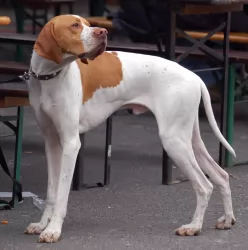 We can find records for pointers from 17th century. Breeds such as Old Spanish and Portuguese Pointer were set in to England from European Mainland. In 1800s they were brought to America and then they slowly developed their hunting skills and in 1910 they became an excellent bird hunter. In 1936 Modern American Kennel was established and they bred pointers in large quantities. They are very popular in southern United States and are called as "bird dog". Pointers are good in hunting birds like pheasant and grouse. They got their name because of their special skills in hunting.
We can find records for pointers from 17th century. Breeds such as Old Spanish and Portuguese Pointer were set in to England from European Mainland. In 1800s they were brought to America and then they slowly developed their hunting skills and in 1910 they became an excellent bird hunter. In 1936 Modern American Kennel was established and they bred pointers in large quantities. They are very popular in southern United States and are called as "bird dog". Pointers are good in hunting birds like pheasant and grouse. They got their name because of their special skills in hunting.
Described as a medium sized dog, the Swiss Shorthaired Pinscher is an extinct variety of the German Pinscher. Like that dog, the Swiss Shorthaired had a muscular, strong square build.
Possibly he also had his ears and tail docked at that time. It is thought that he stood between 40 – 48cm in height and weighed in the region of 11 to 15kg.
He had the typical looks of the Doberman Pinscher with short smooth hair in black and tan, short erect ears and a tail that was traditionally cropped. He was lean and muscular with brown eyes. They were working dogs in their day and were not considered the best dogs to have for the first time dog owner.
These dogs have always been hardworking, brave and fearless. They make good family pets too and get on well with children. They would have been adaptable too to life in the city or the countryside, so long as he got his exercise.
A well bred Swiss Shorthaired Pinscher was alert and a good guard dog, and one wonders why this dog with its good qualities died out.
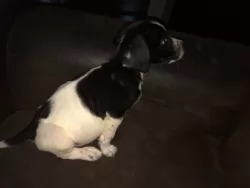 Pointer has a long head and its body is perfectly suitable for hunting. In hunting the pointers shows hunter the direction of the bird and also they will go and get them after they were shot. They are well known for their speed, energy and continuous working. Pointers are also a good companion dog and love the family members so much. It is very easy to groom them as they have short coat. They are very alert and excellent watch dog.
Pointer has a long head and its body is perfectly suitable for hunting. In hunting the pointers shows hunter the direction of the bird and also they will go and get them after they were shot. They are well known for their speed, energy and continuous working. Pointers are also a good companion dog and love the family members so much. It is very easy to groom them as they have short coat. They are very alert and excellent watch dog.
If pointer is not set in huntng then they should be given lots of exercise daily. Pointers love to play and run with children. They will give a good company for cyclists. Pointers show their talents in dog shows especially in obedience and field trials. They will not worry about the crowd surrounding them and performs well. In performing at public, pointer will show perfect attention to its master. Pointer must be trained slowly from its puppyhood to get good results.
The Swiss Shorthaired Pinscher is no longer around but he would no doubt have made a good family pet. He would have wanted to protect his human family.
He was a stubborn, bold dog, and maybe socialization and training didn’t exist then, but he would have benefited from it.
He’s the kind of dog that would have adapted well to life in the city or the countryside, but you could never neglect his exercise needs. In the right environment, this Pinscher would have made a loving, loyal pet.
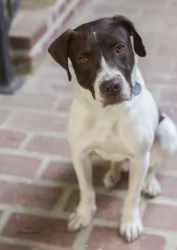 Pointer is a wonderful kid friendly dog and a nice companion. Also he is very energetic,fun-loving and an excellent watchdog. Pointers are very courageous as well as obedient. They can work for a very long time. Early socialization will make them with a good behaviour.
Pointer is a wonderful kid friendly dog and a nice companion. Also he is very energetic,fun-loving and an excellent watchdog. Pointers are very courageous as well as obedient. They can work for a very long time. Early socialization will make them with a good behaviour.
They will be happy if they are given a fenced yard to play and spend their natural energy. They will not have a good behaviour in apartment living. Pointers always likes to be with some one in his family. They are suitable for areas having hot weather and they will not do better in cold weather.
Pointers have very high intelligence and thus they are very easy to train. Good behaviours must be taught to them and the main word they must learn is "NO". They should stop what they are doing when they hear the word "NO" from you. "Sit" is another important word they should learn. Training should be given friendly and not compelling them to do it. Giving reward to them will make them happy and give more interest in training.
It is not too sure about the health status of this extinct dog but we can assume that he would have been prone to some of the typical dog illnesses there are.
Hypothyroidismd, bloat, cancer, cataracts, infections and obesity were just some of the diseases this dog would have had to contend with.
The thyroid glands in the neck produce hormones. These hormones affect the functioning of the body. Hypothyroidism in dogs is usually caused by shrinkage of the thyroid gland or inflammation.The disease occurs more often in Pinscher dogs.
You may notice a dulling or thinning of your dog’s hair, weight gain and reduced activity. Hypothyroid dogs also tend to battle more with ear- and skin infections. Veterinary treatment will become necessary.
It causes a whiteness,cloudiness or opacity on the lens of the eye. It's not painful for a dog but it can cause loss of vision. Surgery can improve vision for the dog.
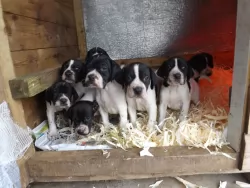 Pointers face health problems such as gastric torsion, hypothyroidism and canine hip dysplasia. Overweight will also lead to many health problems in them. Other problems seen in them are cardiomyopathy, ectropion and progressive retinal atrophy.
Pointers face health problems such as gastric torsion, hypothyroidism and canine hip dysplasia. Overweight will also lead to many health problems in them. Other problems seen in them are cardiomyopathy, ectropion and progressive retinal atrophy.
They have the chances to get several skin disorders which leads to hairfall. Follicular Dysplasia is a hereditary disorder which causes hairfall. Special shampoos or lotion to combat the dry skin should be used to overcome this problem.
In those days of the Swiss Shorthaired Pinscher, maybe commercially manufactured dog foods weren’t available. If the dog were still around today, you would feed him dry kibble for medium sized dogs.
Probably the owners of these dogs fed them from the food they ate. It can be a good idea to feed any dog you have with some homemade food.
This can include things such as boiled chicken, brown rice or pasta and spinach, sweet potatoes and carrots. This is the kind of simple food that dogs love.
Being a farm dog in his day, he was probably tossed raw meat occasionally and this would have done him the world of good.
Although the short, smooth hair of the Swiss Shorthaired Pinscher is looked upon as low maintenance, the dog would have needed a good brush twice a week just to keep it shiny and healthy.
After a hard day of work on the farm, the Swiss Shorthaired Pinscher would have required a nice warm, dry spot to sleep.
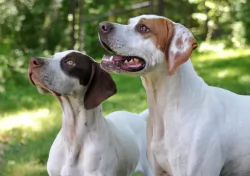 Normally puppies require more food when compared with adult to meet their growth needs. The food given to the pointer puppy must contain vitamins, carbohydrates and minerals. Also the food given to his mother should be continued to the puppy as to avoid digestive problems for the puppy. If it is needed to change the food then it should be done in a step by step process.
Normally puppies require more food when compared with adult to meet their growth needs. The food given to the pointer puppy must contain vitamins, carbohydrates and minerals. Also the food given to his mother should be continued to the puppy as to avoid digestive problems for the puppy. If it is needed to change the food then it should be done in a step by step process.
Pointer can be fed one or two times a day. Usally small meal is given in morning and full meal will be given in the evening. But in case if they will be left alone for the whole day then morning food shall be a full meal. They can be fed meat of goat, pork, fish and woodcock. Brown rice is a good food for pointer.
Pointers will be happy if they are always with their family. They enjoy when they are taken outside for playing or camping. Puppies don't need much exercise as adults need. Adults should not be fed too much as it will lead to overweight.
When pointer is given proper exercises and training they will be a very good mannered dog. They are very active and intelligent dogs and hence require exercise and training regularly. The breed was developed to be a hunting dog and can work continuously in a day. Pointers should be exercised a minimum of an hour per day. They will be happy to run along with your bicycle and playing frisbee with you.